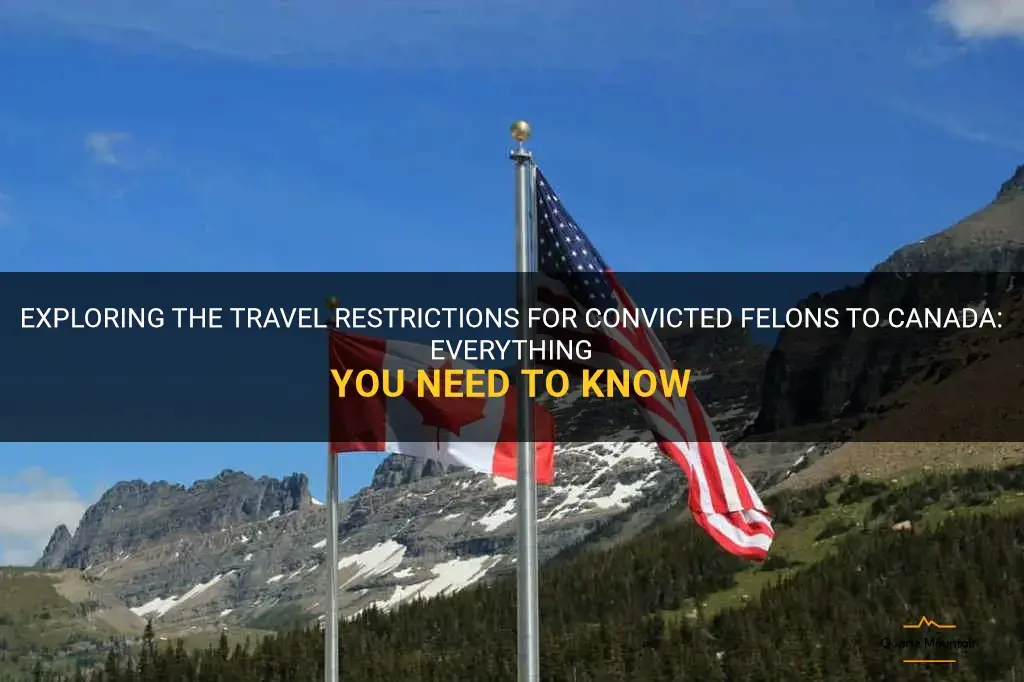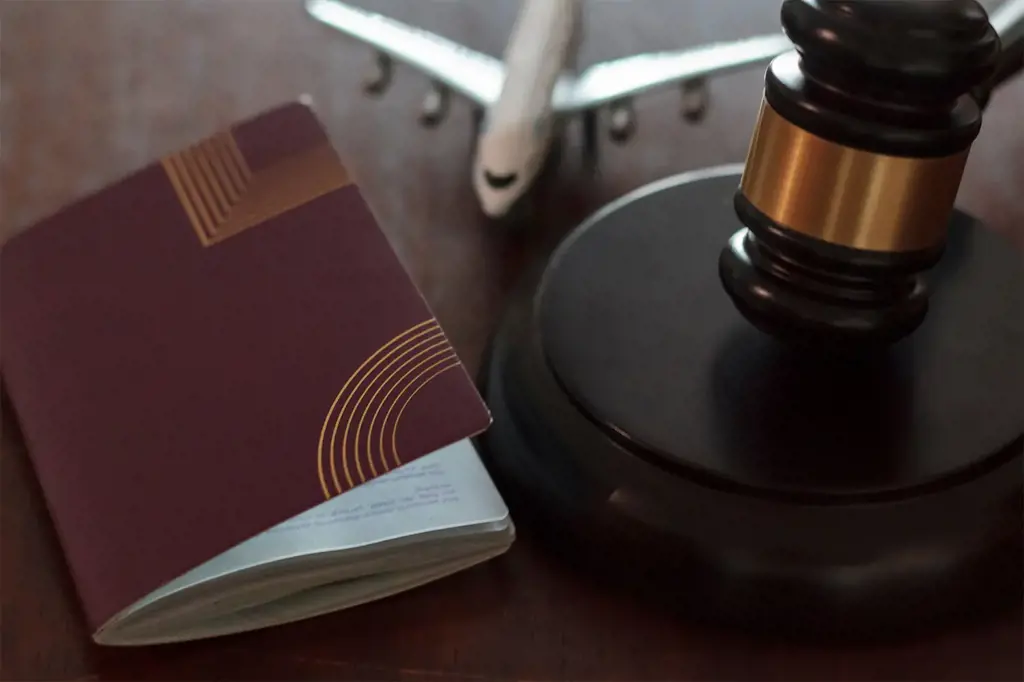
Did you know that having a criminal record can limit your travel opportunities? Canada, known for its beautiful landscapes and vibrant cities, has stringent travel restrictions for individuals who have been convicted of a crime. These restrictions, which apply to both non-Canadians and Canadian citizens, aim to protect the safety and security of the country. So, if you have ever wondered about the consequences of a criminal record on your ability to visit Canada, keep reading to discover more about the convicted felon travel restrictions in this captivating country.
What You'll Learn
- What are some of the travel restrictions that convicted felons face when trying to travel to Canada?
- How long do these travel restrictions typically last for convicted felons?
- Are there any exceptions or ways for convicted felons to travel to Canada despite the restrictions?
- How does Canada determine which individuals are subject to these travel restrictions?
- Are there any resources or organizations that can assist convicted felons in navigating these travel restrictions to Canada?

What are some of the travel restrictions that convicted felons face when trying to travel to Canada?

Traveling to Canada can be a dream come true for many individuals looking to explore its natural wonders and vibrant cities. However, for convicted felons, entering Canada can be a complex and challenging process due to the country's strict travel restrictions.
Canada takes the entry of foreign nationals with a criminal record very seriously. Any person who has been convicted of a crime, regardless of the severity, may be deemed inadmissible to enter the country. It is important for individuals with a criminal record to understand the various travel restrictions they may face when trying to travel to Canada.
One of the main hurdles that convicted felons face when traveling to Canada is the Canadian Immigration and Refugee Protection Act (IRPA). According to this act, certain crimes, such as drug trafficking, assault, and driving under the influence (DUI), can render an individual inadmissible to Canada. This means that even if you have completed your sentence and have a valid passport, you may be denied entry at the Canadian border.
The duration of inadmissibility varies depending on the severity of the crime committed. Generally, individuals with a single conviction may be considered inadmissible for a period of 10 years following the completion of their sentence. Multiple convictions or more serious crimes can result in an indefinite ban from entering Canada.
If a convicted felon wishes to travel to Canada despite these restrictions, there are a few options available. One option is to apply for a Temporary Resident Permit (TRP). This permit allows individuals who are otherwise inadmissible into Canada to enter the country for a specific purpose and a limited duration. TRPs are typically granted in cases where the individual's visit is deemed to be of significant benefit to Canada, such as for business or humanitarian reasons.
Another option is to apply for Criminal Rehabilitation. This process is available to individuals who have completed their sentence and can demonstrate that they have been rehabilitated and are unlikely to reoffend. If approved, Criminal Rehabilitation provides the individual with permanent admissibility to Canada, allowing them to enter the country as a visitor or for other purposes.
It is important to note that these processes can be lengthy, requiring extensive documentation and proof of rehabilitation. It is advisable to consult with an immigration lawyer or a Canadian consulate or embassy in order to understand the specific requirements and procedures for applying for these permits.
In conclusion, traveling to Canada for individuals with a criminal record can be a challenging process. The Canadian government takes the entry of foreign nationals with a criminal record seriously and imposes strict travel restrictions. However, with the proper legal guidance and documentation, it may be possible for convicted felons to enter Canada through Temporary Resident Permits or Criminal Rehabilitation, allowing them to experience the beauty and charm of the Great White North.
Exploring the Latest Travel Restrictions to Massachusetts: What You Need to Know
You may want to see also

How long do these travel restrictions typically last for convicted felons?

Travel restrictions for convicted felons can vary depending on the severity of the crime committed and the specific laws of the jurisdiction. In many countries, being convicted of a felony can result in travel restrictions that can last for a certain period of time or even be permanent.
In the United States, for example, individuals who have been convicted of a felony may face travel restrictions that prevent them from obtaining or renewing a passport. The U.S. Department of State has the authority to deny passport applications or revoke existing passports for individuals who are subject to certain legal conditions, including being convicted of a felony drug offense or a felony involving a federal offense against a minor.
The length of these travel restrictions can vary. In some cases, individuals may be banned from obtaining a passport for a specific period of time, typically several years, while in other cases the ban may be permanent. The specific restrictions and their duration are typically determined by a judge or other legal authority during sentencing.
In addition to passport restrictions, individuals convicted of a felony may also face limitations on international travel due to restrictions imposed by other countries. Some countries have strict immigration policies that prohibit individuals with criminal records from entering their borders. These restrictions can also vary in duration, from a temporary ban to a lifetime exclusion.
It is worth noting that travel restrictions for convicted felons are not limited to international travel. In many cases, individuals may also face restrictions on domestic travel. Probation or parole conditions may require individuals to obtain permission from their probation officer or parole supervisor before traveling outside a certain geographic area.
The purpose of travel restrictions for convicted felons is to ensure public safety and prevent individuals from fleeing jurisdiction or engaging in illegal activities abroad. While these restrictions can be challenging and limiting for those who are subject to them, they are considered an important aspect of the criminal justice system.
It is important for individuals with a felony conviction to consult with legal professionals to understand the specific travel restrictions that apply to their situation. An experienced attorney can provide guidance on how to navigate the legal requirements and potentially seek modifications or waivers for travel restrictions in certain circumstances.
Travel Restrictions in Antalya: What You Need to Know
You may want to see also

Are there any exceptions or ways for convicted felons to travel to Canada despite the restrictions?

Convicted felons face challenges when it comes to traveling internationally, especially to countries like Canada that have strict entry requirements. Canada, for instance, has restrictions in place that can make it difficult for individuals with a criminal record to enter the country. However, there are some exceptions and ways for convicted felons to travel to Canada despite these restrictions.
The first thing to note is that Canada deems certain offenses as serious criminality, making individuals with such convictions inadmissible. These serious offenses include, but are not limited to, murder, assault causing bodily harm, sexual assault, and driving under the influence causing bodily harm or death. In general, if you have been convicted of a crime punishable by a maximum term of imprisonment of at least ten years in Canada, you may be considered inadmissible.
However, there are avenues available for individuals with criminal records to overcome these restrictions. One option is to apply for rehabilitation, which is a formal process that allows individuals with a criminal record to demonstrate that they have been rehabilitated and are no longer a risk to Canadian society. To be eligible for rehabilitation, a certain period of time must have passed since the completion of the sentence imposed for the offense. The length of this period varies depending on the severity of the offense committed.
Another option is to apply for a Temporary Resident Permit (TRP). A TRP allows individuals who are otherwise inadmissible to enter Canada for a specific purpose and period of time. It is generally granted in cases where the individual can demonstrate a compelling reason for their entry despite their criminal record. The TRP is not a long-term solution, as it needs to be renewed periodically, but it can provide an opportunity for convicted felons to travel to Canada under certain circumstances.
It's important to note that both the rehabilitation process and the TRP application require thorough documentation, such as court records, character references, and evidence of rehabilitation efforts. The application process can be complex and time-consuming, so it's recommended to seek legal assistance to maximize the chances of a successful outcome.
In some cases, individuals may be able to enter Canada without going through the rehabilitation or TRP processes. For instance, if the offense committed falls under a non-serious category or if it has been deemed a summary offense, the person may be deemed rehabilitated automatically after a certain period of time, usually ten years, has passed since the completion of the sentence.
It's important to be aware that each case is unique, and there is no guarantee that an exemption or permission to enter Canada will be granted. It is advisable for convicted felons to consult with an immigration lawyer or a licensed immigration consultant who can assess their specific circumstances and provide guidance on the best course of action.
In conclusion, while there are restrictions in place for convicted felons to enter Canada, there are exceptions and avenues available to overcome these restrictions. Rehabilitation and Temporary Resident Permits can be options for entry, but they require thorough documentation and a strong case to demonstrate rehabilitation and/or a compelling reason for entry. Consulting with a legal professional is crucial to navigate the complexities of the application process and increase the chances of a successful outcome.
Exploring the Latest Phuket Travel Restrictions: What You Need to Know
You may want to see also

How does Canada determine which individuals are subject to these travel restrictions?

Canada has implemented travel restrictions in order to control the spread of COVID-19 and protect its citizens. These travel restrictions vary depending on the country and are continuously assessed and adjusted as the situation evolves.
The Canadian government determines which individuals are subject to these travel restrictions based on various factors. One of the main criteria is the country of origin or departure. Different countries have different levels of COVID-19 transmission and the risks associated with travel from these countries can vary.
Canada has established a list of countries with higher COVID-19 transmission rates, and individuals coming from these countries may face stricter travel restrictions. This list is regularly updated based on the global situation and is available on the official website of the Government of Canada.
In addition to country-specific restrictions, Canada also considers the purpose of travel. Essential travel, such as for healthcare workers, transportation crews, or individuals returning to Canada, is generally exempt from certain restrictions. Non-essential travel, such as for tourism or leisure, may be subject to additional requirements and restrictions.
Another important factor in determining travel restrictions is vaccination status. Canada has implemented a vaccination passport system, known as the ArriveCAN app, which allows individuals to upload their vaccination information. Vaccinated individuals may be subject to less stringent requirements and may be exempt from certain quarantine measures.
Furthermore, Canada utilizes a risk-based approach to determine travel restrictions. This means that the level of risk associated with a particular country or traveler is assessed based on factors such as the number of COVID-19 cases, the presence of COVID-19 variants, and the healthcare capacity of the country of origin.
It is important to note that these travel restrictions are subject to change and individuals planning to travel to Canada should regularly check the official website of the Government of Canada for the most up-to-date information. Moreover, these restrictions may differ for Canadian citizens, permanent residents, and foreign nationals, so it is essential to review the specific requirements for each category.
Overall, Canada determines which individuals are subject to travel restrictions based on factors such as the country of origin, purpose of travel, vaccination status, and the level of risk associated with the traveler's origin country. By doing so, the Canadian government aims to mitigate the spread of COVID-19 and ensure the health and safety of its population.
Understanding CDC Mexico Travel Restrictions: What You Need to Know
You may want to see also

Are there any resources or organizations that can assist convicted felons in navigating these travel restrictions to Canada?

As a convicted felon, traveling abroad can be a complex process, especially when it comes to entering another country like Canada. Canadian immigration laws impose certain restrictions on entry for individuals with criminal records, which can make it challenging for felons to visit or immigrate to Canada. However, there are resources and organizations that can assist convicted felons in navigating these travel restrictions and help make the process smoother.
One such resource is the Canadian Border Services Agency (CBSA). The CBSA is responsible for enforcing immigration and customs regulations in Canada. They provide information on their website regarding the entry requirements for individuals with criminal records. The CBSA also has a toll-free telephone line that individuals can call to inquire about their eligibility to enter Canada.
In addition to the CBSA, there are organizations that specialize in assisting individuals with criminal records in traveling to Canada. These organizations provide guidance, support, and resources to help convicted felons understand and navigate the complex immigration laws.
One such organization is the Canada Border Crossing Services (CBCS). CBCS offers personalized assistance and consulting services to individuals with criminal records who are interested in traveling to Canada. They have a team of experts who can assess an individual's eligibility to enter Canada and help them understand the necessary steps to take.
Another organization that provides similar services is the Canada Pardon & Waiver Services (CPWS). CPWS assists individuals with criminal records in obtaining pardons and waivers, which can help them overcome the travel restrictions imposed by Canadian immigration laws. They offer personalized guidance throughout the pardon and waiver application process.
It is important to note that while these resources and organizations can provide assistance, the final decision on whether an individual with a criminal record can enter Canada lies with the CBSA. Each case is evaluated on an individual basis, taking into consideration the nature of the offense and the length of time since the conviction.
To increase the chances of a successful entry into Canada, convicted felons should be prepared and proactive. Gathering all necessary documentation, such as criminal records and court documents, can help support their case. They should also be honest and forthcoming about their criminal history when applying for a visa or attempting to enter Canada.
Navigating the travel restrictions to Canada as a convicted felon can be challenging, but with the help of resources and organizations such as the CBSA, CBCS, and CPWS, individuals can receive the guidance and assistance they need to understand the process and increase their chances of a successful entry into Canada. It is crucial to do thorough research and seek professional advice to ensure a smooth and hassle-free travel experience.
Dubai to U.S. Travel Restrictions: What You Need to Know
You may want to see also
Frequently asked questions
Yes, it is possible for a convicted felon to travel to Canada, but it can be more challenging compared to individuals without a criminal record. Canada has strict entry regulations, and anyone with a criminal conviction may be deemed inadmissible. However, there are several options available for individuals with a criminal record to gain entry, such as applying for temporary resident permits or rehabilitation.
A temporary resident permit (TRP) is a document that allows individuals with a criminal record to enter Canada for a specific purpose and period of time. It is issued at the discretion of Canadian immigration authorities and requires the applicant to demonstrate that their entry to Canada is justified for compelling reasons, such as family visits, work, or business purposes. The TRP is typically valid for up to three years and can be renewed.
Rehabilitation refers to the process of demonstrating that an individual with a criminal conviction has been rehabilitated and is unlikely to reoffend. This is an important factor for Canadian immigration authorities when considering the admissibility of individuals with criminal records. Depending on the seriousness of the offense, a certain period of time must elapse before an individual can apply for rehabilitation. Successful rehabilitation can lead to the removal of inadmissibility and allow entry into Canada.
Yes, there are certain restrictions and considerations for convicted felons traveling to Canada. It is crucial to be honest and transparent about any criminal history when completing the required immigration forms. Failing to disclose or providing false information can lead to a permanent ban from Canada. Additionally, it is advisable to consult with an immigration lawyer or specialist to understand the specific requirements and options available for individuals with a criminal record who wish to visit or immigrate to Canada.







